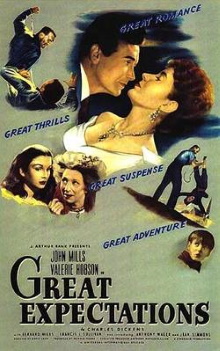
Over the past few years, we’ve watched almost the entirety of David Lean’s filmography. All that is left are his Charles Dickens adaptations and Doctor Zhivago. After a long pause, I thought I’d get back to it, so here is Great Expectations. I’ve neither watched any version of this nor read the original novel, so the entire thing was new to me.
Orphaned at a young age, Pip is brought up by his sister and her blacksmith husband Joe. One day, he runs into an escaped convict who forces him to fetch food and a file for his chains. Pip does so without telling anyone but the convict is caught anyway. Later he is sent to the decaying mansion of a rich spinster Miss Havisham as company and to play with her adopted daughter Estella. Pip immediately falls in love with Estella though she is cold and cruel towards him as taught by Miss Havisham. Years later, after Pip has started his blacksmith apprenticeship with Joe and Estella has left for France to be tutored as a proper lady, Pip is called to London to meet with a lawyer. A mysterious benefactor whose identity is kept secret wishes to finance Pip’s transformation into a gentleman. Pip assumes that the benefactor is Miss Havisham and delightedly agrees.
The first thing that strikes me about this film is how old-fashioned it feels in every sense. The people and the way they dress and talk, the photography, but most of all, their values and social mores. For example the distinction between a gentleman and a common man is quite distinct here, so much so that it’s disturbing how deferentially Joe treats Pip once he takes to wearing fancy clothes. There is some novelty value in this and I like that I didn’t quite know what to expect out of this film at every turn and so was surprised by the twist. I understand that this represents a very abridged adaptation of the original novel but from what I can tell it is quite faithful to the spirit of the novel, which is one reason why this film is rated so highly. There are some problems such as how actor John Mills looks too old to play Pip as a young adult but on the whole this is a well made film that makes for an engrossing watch even today.
Still the main problem is that the values and social mores being espoused here are so different from our time that it’s hard to hold this up as being anything admirable. The plot itself about a mysterious benefactor funding a young man to uplift himself to a high social class is preposterous and by today’s standards, feels incredibly sinister. It’s also distressing how this story depicts women in a uniformly poor light. Miss Havisham is the archetypal man-hating witch and Estella her devoted student. Neither have any redeeming qualities whatsoever while even a male convict can be shown in a sympathetic light. Pip’s own sister is a shrew while Joe is kind. The only positive female figure is Biddy who at all times behaves in a submissive manner in the presence of men. Apart from this, I also dislike that the film starts to dip into how Pip has been corrupted by his new lifestyle and yet that goes nowhere and he is properly righteous and heroic once he realizes that Miss Havisham has tricked him.
This lopsided view of women is especially egregious but Dickens’ view of the social classes can be inferred from the story as well. While he does show some affection for Joe’s simple life, it’s clear that he thinks learning to dance, fence and to behave properly as a gentleman is of more intrinsic worth. From this I infer that Dickens’ book was popular when it was released because the reflected the views of the people at that time, and even then he had to change its ending because the public demanded a happy outcome for Pip and Estella. This adaptation was itself praised for being well made and for being so faithful to its source material. But judged by today’s standards, it feels so wrong that I find it impossible to recommend this film.